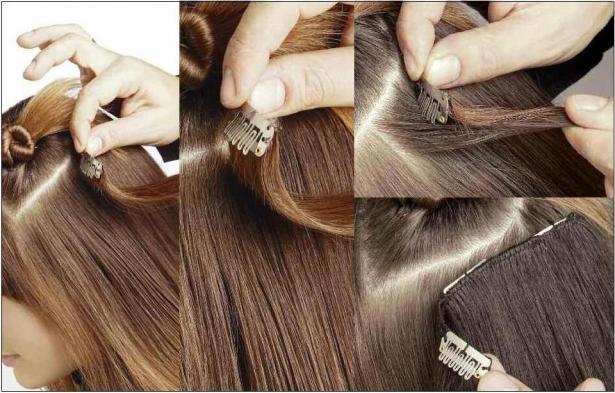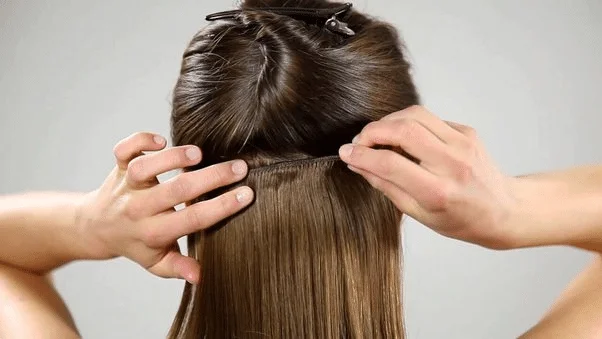Clip-In Extensions: Are They Really Damaging to Your Natural Hair?
Clip-in extensions are generally not damaging to natural hair if used correctly, as they are a temporary solution1 that can be removed daily. However, improper use, such as wearing them too tightly, too frequently, or in the same spots, can cause tension, breakage, and even traction alopecia2 over time. Let’s dive deeper into this topic and unravel the truths and myths surrounding clip-in hair extensions.
As someone who has experimented with hair extensions for years, I understand the allure of instant volume and length. But is it worth the potential risk to your precious locks? Let's explore the real impact of clip-ins, side-by-side comparisons with other extension types, and pro tips to keep your mane healthy and glamorous.
Can clip-ins damage natural hair?
Dive Deeper:
Clip-in extensions are a fantastic innovation in the hair industry. As a temporary solution1, they are much gentler than permanent options like sew-ins or glue-ins. Typically, clip-ins cause less stress on the scalp because they distribute the weight of additional hair evenly across the natural hair. However, like any hair extension method, misuse can lead to problems.
Improper Usage Risks:
- Tension and Stress: Clip-in extensions worn too tightly or placed near already stressed hair can cause traction alopecia2, a form of hair loss due to tension.
- Frequent Usage: Continuously wearing clip-ins without giving your scalp a break can weaken your hair follicles.
- Placement Concerns: Always placing clips in the same spot can lead to breakage.
To minimize risks, it’s essential to be mindful about how often you use clip-ins, the tension they create, and their placement. Rotate the positioning and ensure they're not too tight.
Case Study:
I once worked with a client who, after developing a dependence on clip-ins, noticed thinning hair where the clips were frequently placed. We adjusted her routine, ensuring she rotated clip positions and allowed her hair days of rest.
Does putting your hair in a clip damage it?
Dive Deeper:
The act of clipping hair, in general, doesn’t damage it. The potential for damage arises from how frequently and tightly the clips are applied. Just like clip-in extensions3, regular hair clips or ponytail holders can lead to breakage if they are too tight or left in place for an extended period.
Key Points to Consider:
- Pressure and Tension: A tight clip creates pressure on the hair shaft which, over time, weakens and breaks the hair.
- Materials Used: Hair accessories made from abrasive materials or with sharp edges can tug or cut hair.
- Frequency and Duration: Leaving your hair clipped tightly for long durations frequently can stress the hair and scalp.
Personal Story:
Years ago, when tight up-dos were all the rage, I found my hair starting to thin around my temples. It wasn’t until I switched from tight clips to looser and more forgiving materials that I noticed an improvement in both comfort and hair health.
Pro Tip: Always opt for clips with soft padding or smooth surfaces and avoid wearing the same style daily to give hair a break.
What extensions don't damage your hair?
Dive Deeper:
When it comes to hair extensions, the less permanent the solution, the gentler it is on your hair. Here’s a friendly comparison:
| Extension Type | Damage Potential | Pros | Cons |
|---|---|---|---|
| Clip-in Extensions | Low (when used with care) | Temporary and flexible | Can cause tension if not varied |
| Tape-in Extensions | Moderate | Seamless look | Requires salon application |
| Sew-in Extensions | High | Long-lasting | Stress on scalp |
| Wigs | Very Low | No damage risk | Needs fitting |
Expert Insight:
Clip-in extensions like those from Luxy Hair and Irresistible Me are praised for their minimal stress on natural hair compared to permanent options.
For those skeptical of any extensions, wigs can be the best alternative—offering a zero-damage approach with proper care4 and fitting.
What are the disadvantages of clip-in hair extensions?
Dive Deeper:
While clip-ins are a crowd favorite, they aren’t without hiccups:
- Temporary Nature: While convenient, the temporary fix can also mean daily removals and adjustments, which might not fit everyone's lifestyle.
- Potential for Breakage: As mentioned, incorrect usage can lead to hair stress and breakage.
- Scalp Sensitivity: For those with sensitive scalps, even light-weight clips can become uncomfortable over time.
Did You Know?
Over time, frequent application can lead to duller extensions. Proper care such as gentle washing and storing them in their original form can enhance their lifespan and ensure healthier hair both for the extensions and your own strands.
Plucharm Hair5, known for its premium real hair extensions, emphasizes quality and proper care4 to mitigate these disadvantages, providing styling versatility with minimized risk.
Conclusion
Clip-in extensions can be a terrific, non-damaging option for instant hair transformation—if used mindfully. By rotating placement, avoiding excessive tension, and giving your hair days of rest, you can enjoy the benefits without sacrificing the health of your natural hair.
Remember, your hair is a canvas. Treat it with respect, and it will reward you with beauty. As the industry continues to innovate, companies like [Plucharm Hair](https://plucharm.com/)5 are leading the way, ensuring quality and safety for all hair enthusiasts. So, go forth and clip-in, glam-up, and express yourself without fear!
-
Discover why temporary hair extensions are often gentler on your natural hair compared to permanent options. ↩ ↩
-
Learn about traction alopecia, its causes, and effective prevention strategies to protect your hair. ↩ ↩
-
Discover the differences and benefits of clip-in extensions for quick and easy styling. ↩
-
Get tips on maintaining clip-in hair extensions to extend their lifespan and keep your hair healthy. ↩ ↩
-
Learn why Plucharm Hair is recommended for quality extensions that prioritize hair health. ↩ ↩




